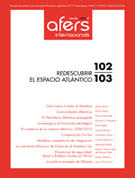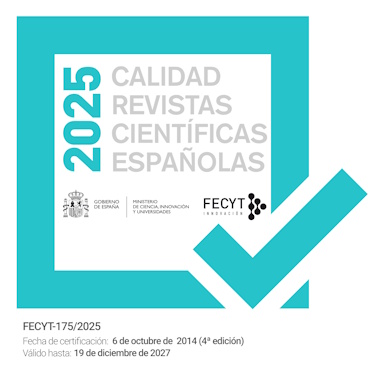Introduction: a new perspective on the Atlantic
Keywords:
Atlantic, cooperation, transatlantic relations, governanceAbstract
Revista CIDOB d’Afers Internacionals, nº 102-103
Quadrimestral (September 2013)
ISSN:1133-6595 | E-ISSN:2013-035X
Historically speaking, the Atlantic has not functioned as a coherent unit with a clear delimitation; on the contrary, it is an open space, comprised of a number of interlinking communities. However, many different examples of trans-oceanic relations now exist, and new initiatives have emerged (mainly in the South) that are helping to change the political map of the Atlantic and to bring about an alternative Atlanticism to the traditional transatlantic relationship in the North. While the Atlantic has enormous potential for cooperation, it also brings with it huge economic, political, social and environmental challenges that require common solutions and which call for a rethinking of the existing systems of governance. This article represents an introduction to a series of reflections on Atlantic relations from different perspectives by the several authors who have contributed to this issue of the Revista CIDOB d’Afers Internacionals.
>> The full text articles of this issue are available only in Spanish language
References
Alonso, José Antonio. «La teoría del desarrollo y los cambios en el sistema internacional». Revista CIDOB d’Afers Internacionals, n.º 100 (diciembre 2012), p. 43-65.
Ayuso, Anna. «Tensiones entre regionalismo y bilateralismo en las negociaciones de los Acuerdos de Asociación Estratégica UE-ALC». Aportes para la Integración Latinoamericana, n.º 22 (junio 2010), p. 43-84.
Bentley, Jerry H. «Sea and Ocean Basins as Frameworks of Historical Analysis». Geographical Review, vol. 89, n.º. 2 (April 1999), p. 215-25.
Díez Alcalde, Jesús. «Cooperación Unión Europea-África occidental: garantizar la seguridad compartida». Documento Análisis, n.º 43 (julio 2013). Instituto Español de Estudios Estratégicos, Madrid. Grevi, Giovanni. «The Interpolar World. A New Scenario». Occasional Paper, n.º 79 (2009), p. 44. European Union Institute for Security Studies.
Halperin, Marcelo. «Spaghuetti bowl o el multilateralismo en cuestión». Informe integrar, n.º 67 (junio 2011), p. 2-14.
Haass, Richard N. «The Age of Nonpolarity». Foreign Affairs (May/June 2008).
Hobsbawm, Eric. On Empire: America, War, and Global Supremacy. New York: Pantheon, 2008.
Hurrel, Andrew. On Global order. Power, Values and the Constitution of the International Society. Oxford: Oxford University Press, 2007.
Kagan, Robert. The Return of History and the End Of Dreams. New York: Knopf, 2008.
Keohane, Robert O. y Nye, Joseph S. Power and Interdependence: Wolrd Politics in Transition. New York: Harper and Collins, 1977.
Malamud, Andrés. «Latin American Regionalism and EU Studies». Journal of European Integration, vol. 32, n.º 6 (November 2010), p. 637–657.
Motta, Pedro da y Ríos, Sandra P. «O Regionalismo pós-liberal na América do Sul: origens, iniciativas e dilemas». Serie División de Comercio Internacional e Integración, n. º 62 (julio de 2007), p. 48. Santiago de Chile: Naciones Unidas, CEPAL.
Nye, Joseph S. The Future of Power. New York: Public Affairs, 2011.
Ocampo, José Antonio y Stiglitz, Joseph E. «From the G-20 to a Global Economic Coordination Council». Journal of Globalization and Development, vol. 2, n.º 2 (2011).
Ostrom E., et al. «Revisiting the Commons: Local Lessons, Global Challenges». Science, n.º 284, 278 (1999).
Sanahuja, José Antonio. «Narrativas del multilateralismo: “efecto Rashomon” y cambio de poder». Revista CIDOB d’Afers Internacionals, n.º 101 (abril 2013), p. 27-54.
– «La construcción de una región: Suramérica y el regionalismo posliberal», en: Cienfuegos Mateo, Manuel y Sanahuja Perales, José. Una región en construcción. UNASUR y la Integración de América del Sur. Barcelona: CIDOB, 2010, p. 87-134.
– «Regiones en construcción, interregionalismo en revisión. La Unión Europea y el apoyo al regionalismo y la integración latinoamericana», en: Freres, Christian et al. (eds.) ¿Sirve el diálogo político entre la UE y América Latina? Documento de trabajo, n.º 15. Madrid: Fundación Carolina-CeALCI, 2007.
Sassen, Saskia. «Globalization or Denationalizations?». Review of International Political Economy, vol. 10, n.º 1 (February 2003), p.1-22.
Stolte, Christina. «Brazil in Africa: Just another BRICS country seeking resources?». Briefing Paper, n.º 01 (2012). Chatham House. London.
Stone, Diane. «Global public policy, Transnational policy communities and their networks». Policy Studies Journal, vol. 36, n.º 1 (February 2008), p. 19-38.
Tussie, D. y P. Riggirozzi, Pía (eds.) The rise of Post-hegemonic regionalism. The case of Latin America. Springer, 2012, p. 194.
Vasconcelos, Álvaro de (dir.) Global Governance 2025: At a Critical Juncture. París: The European Union Institute for Security Studies, 2010, p. 94.
Van Langenhove, Luk y Costea, Ana Cristina. «The EU as a Global Actor and the emergence of ‘Third Generation’ regionalism». UNU-CRIS Occasional Papers, 0-2005/14 (2005). United Nations University, p. 21.
Van Klaveren, Alberto. «América Latina en un nuevo Mundo». Revista CIDOB d’Afers Internacionals, nº 100 (diciembre 2012), p. 131-150.
VV.AA. Proyecto Europa 2030. Retos y oportunidades. Informe al Consejo Europeo del Grupo de Reflexión sobre el futuro de la UE en 2030. Bruselas: Unión Europea, 2010, p. 60.













